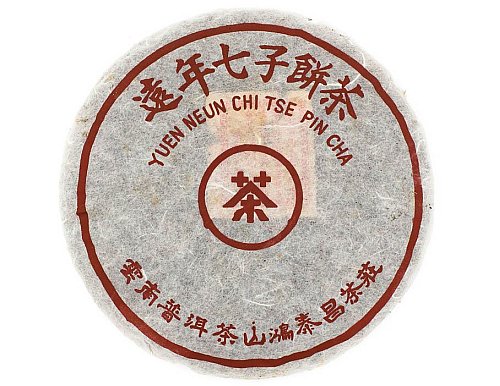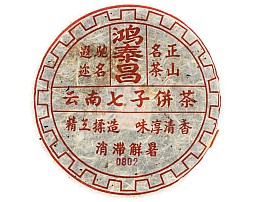2004 Юань Нянь Хунтайчан шен пуэр
Урожай: 2004
Высота: 1300 м
Возраст деревьев: 200-300 лет
Доступность: На складе
Выдержанный Шен 2004-го года с завода на севере Таиланда, который производит пуэры под китайской маркой Хунтайчан в провинции Чианг Рай. Высота произрастания деревьев 1100-1300 метров над уровнем моря. Слова "юань нянь" означают "долгие года". То есть название этого шена можно перевести как "чай долгих лет". Возраст деревьев 200-300 лет.
Промышленная прессовка, блин 357 грамм.
Вкус зрелый, полный, округлый - солидный вкус выдержанного шена. В доминанте сухофрукты, свежая слива, груша, пряности. Мощный вкус со сладкими древесными тонами создает ощущение, что перед нами шен 90-х годов. На втором плане цветочно-сливовые тона. Настой темный, солидный, под стать вкусу. Через 8 грамм чая легко проливается 2 литра воды.
Состояние: бодрость, ясность, внимательность. Весьма сильный пуэр.
Непременно украсит любую коллекцию пуэров.
Обратите внимание на важный факт.
Hong Tai Chang - это один из наиболее часто подделываемых чаев. Уж очень он был знаменит в свое время... На Aliexpress и Taobao встречается молодой чай под разными обложками Хун Тай Чан. В описании указано, что он произведен в Юньнани. Это не может быть правдой.
Несмотря на то, что торговая марка была зарегистрирована в Юньнани, Хун Тай Чан делал свои пуэры в Таиланде из материала с тайских деревьев. Юннаньский материал использовался только в самом начале пути, в 30-х годах, и затем его полностью заменили на тайский со старых деревьев. Сама компания, бренд и офис в Ибанге, закрылись в 1949.
Только тайский чай, изготовленный под маркой Hong Tai Chang, несёт в себе дух той эпохи, благодаря оригинальным сортам старых деревьев и передающимся традициям.
Отзывы (17)
Это шен с глубоким и выдержанным характером, создающий впечатление времени, запечатлённого в каждой его нотке. Сухой лист, со своей сдержанной древесно-сладкой ароматикой, будто приглашает окунуться в путешествие по истории. Прогретый чайник открывает более насыщенные грани, добавляя оттенки чернослива и груш, которые становятся выразительным вступлением к насыщенному вкусу.
С первых проливов напиток встречает мягкостью и сладостью, напоминающей сухофрукты и спелые сливы, и груши. Его густая, обволакивающая текстура, словно золотой ликер, чистый и яркий. Древесные акценты и лёгкая дымка дополняют композицию, придавая чаю многогранность. Сам настой маслянистый, обволакивающий, густой.
Это чай для тех, кто ценит утонченность и глубину. В каждом проливе он раскрывает новые грани, оставаясь при этом цельным и структурированным. Хунтайчан 2004 словно говорит: возраст — это не просто цифра, это искусство времени, выраженное через вкус и аромат. Один из моих любимых шенов. Заваривать можно и кипятком и чуть оствывшей водой (90 градусов), получается в любом случае прекрасно. Рекомендую еще ознакомиться с вариантом 0802 (2006 года), тоже мой любимчик!
Короткие (5-10 секунд) проливы, температура воды 90 °C.
Ликер прозрачный, темно-золотистого карамельного цвета, похож на виски.
Вкус чистый, древесный, с фруктовой нотой, напоминающей чернослив, и сладким послевкусием, завершающимся намеком на цветочную ноту.
Во рту ощущается легкая липкость на губах без терпкости.
Влажные листья имеют темный бронзово-коричневый оттенок в сочетании со стеблями, издавая слабый аромат жженых фруктов.
Сила вкуса начинает ослабевать к 5-му настою, поэтому с этого момента лучше настаивать дольше.
Более длительная (1 минута) заварка следующего настоя дает более выраженное сладкое послевкусие.
Перед этим чаем я попробовал шэн HongTaiChang 0802 2006 года.
В сравнении с ним, у шэна 2004 года меньше характера и вкуса.
Однако в нем отсутствует и сухость с терпкостью, которые ярко выражены в HongTaiChang 0802 2006 года, что делает этот шэн 2004 года гораздо более дружелюбным старым шэном для моего вкуса.
Должен сказать, что это также один из самых чистых старых шэн пуэров, которые я пробовал, что является большим плюсом для меня.
Тонкостенный глиняный чайник 7гр/150мл. Начитался о нем отзывов и возлагал большие надежды, но чай не впечатлил ни возбействием ни вкусом. Чтобы хоть что-то пришло, нужно экспонировать пару минут. Чай бездушный.
Комментарий от TEASIDE:
Мы продаем этот чай около 10-ти лет. С тех пор его успели попробовать не только опытные любители пуэров, но и чайные эксперты с мировым именем. В разные года, в разных странах. И всегда этот чай получал самые высокие оценки, что легко прослеживается по отзывам на нашем сайте. Абсолютно все отзывы на нашем сайте честные и мы никогда не нарушаем это правило.
Таким образом, очевидно, что проблема не в чае..
Старый чай требует внимательного, вдумчивого подхода. Любой серьезный чай следует попробовать 2-3 раза, прежде чем что-то по нему заявлять. Это правило я использую и сам, каждый раз перед новыми закупками.
В данном, конкретном случае, я могу порекомендовать следующее.
Первым делом, сменить воду - лучше всего, на мой взгляд, использовать максимально мягкую воду. Жесткая вода создает ощущение нехватки температуры, чай не раскрывается должным образом, приходится увеличивать время экспозиции. При этом, минеральный шлейф, все равно, будет продолжать маскировать собой нежные и тонкие переливы вкуса.
Второе, попробовать заварить в другой посуде. И хотя вода здесь намного важнее, смена посуды даст возможность посмотреть на чай под другим углом.
Ну и нарабатывать вкус.. думать, экспериментировать и не спешить с выводами.
--- Валерий Левитанус
Очень темный и плотный чай с вкусной глубокой древесной сладостью, которая просто увела меня в страну грез. В середине сеанса я почувствовала щекотку на ноге и обнаружил маленького паучка, который подполз ко мне. Мы называем их здесь "прыгающими пауками" и восхищаемся их совершенной формой и их подвигами внезапного перепрыгивания с одной поверхности на другую. После того как мой маленький чайный друг исчез и я закончил сеанс, я высыпал "отработанные" чайные листья в 24-унцевую атласную банку, добавил горячей воды и оставил завариваться на солнце на несколько часов. Позже, в жаркий полдень, я разлил чай по бокалам со льдом, чтобы получить несколько стаканов бодрящего напитка в этот первый день июля 2022 года.
Это мой любимый шен «Лучшее соотношение цена/качество» от TEA SIDE.
Это золотая середина между действительно выдержанными 90-ми годами и шеном 0802, который, кажется менее влажного хранения -
сначала я думал, что это пуэр традиционного хранения..
Он более старый, вкус более размытый, но на забавный манер - он все еще сложный, а вкус сильный.
Как и большинство TEA SIDE гушу - сливовые ноты с большим количество проливов и хорошая ци.
Настоятельно рекомендуется.








